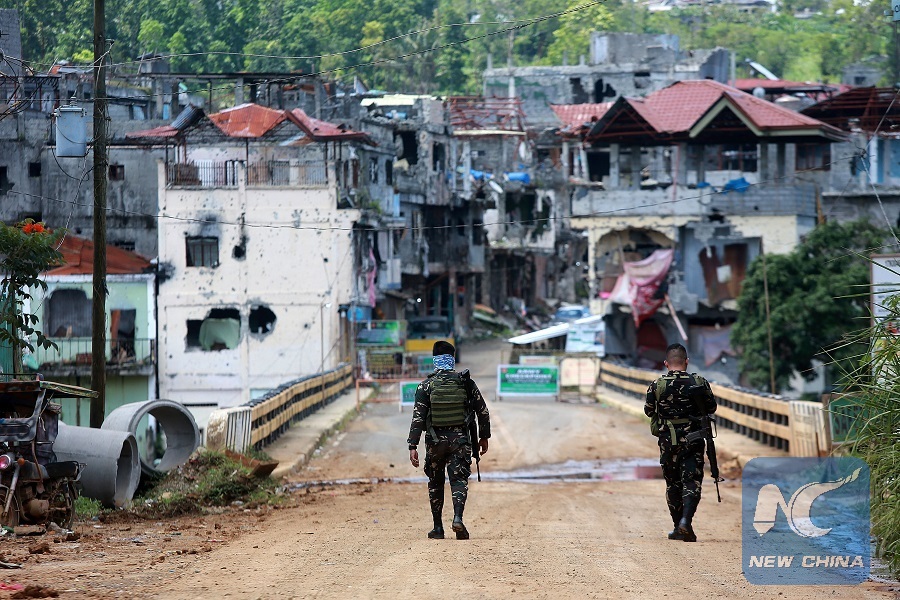
In this file photo, soldiers from the Armed Forces of the Philippines walk to a bridge in the war-tornMarawi City, the Philippines, May 22, 2018. (Xinhua/Rouelle Umali)
MANILA, Dec. 12 (Xinhua) -- The Philippine Congress granted President Rodrigo Duterte's request to further extend martial law and the suspension of the privilege of the writ of habeas corpus in Mindanao for a period of one year to Dec. 31, 2019, to quell a "continuing rebellion" in the southern Philippine region.
After deliberating for almost four hours in a special joint session on Wednesday, lawmakers from both the Senate and the House of Representatives voted 235-28-1 in favor of another one-year extension of martial rule in Mindanao.
This is the third extension granted to Duterte since he imposed martial law in May 2017 after rebellion militants laid siege to Marawi City.
Under the martial law and the suspension of the privilege of the writ of habeas corpus in Mindanao, security forces are allowed to make arrests, detain or search without a warrant. This means that people who have committed the crime of rebellion or even suspected ones may be arrested without a warrant of arrest, and objects that are used in the commission of the crime of rebellion may be seized without a search warrant.
With the extension of martial law, Philippine Presidential Spokesperson Salvador Panelo said the Duterte government "expects to achieve substantial progress in addressing the persisting rebellion in Mindanao, as well as promoting the overall security and peace and order situation in the island."
In a letter to Congress last week, Duterte asked lawmakers to allow the martial law to continue in Mindanao to quell terrorist groups that "continue to defy the government by perpetrating hostile activities."
In justifying his request for a third extension of martial law in Mindanao, Duterte added that despite the significant progress, "rebellion still persists in Mindanao and that the public safety requires the continuation of martial law in the whole of Mindanao."
Specifically, he cited the several bombings that rocked many parts of Mindanao in the past few months that killed a number of people.
Mindanao has been the hotbed of violent extremism and a brewing rebellion for decades. In more recent years, Mindanao witnessed the perpetration of numerous acts of violence like the Marawi siege and bombings in major cities.
Members of Duterte's security team, led by Defense Secretary Delfin Lorenzana, briefed the lawmakers before the voting on the need to place Mindanao under martial rule, citing lingering threats from rebel and extremist groups.
The team called upon Congress to allow the further extension of martial law "to assist the Armed Forces of the Philippines (AFP), the Philippine National Police (PNP) and all other enforcement agencies to put a decisive end to this ongoing rebellion and, thereby, remove a long-standing obstacle to the full rehabilitation and development of Mindanao."
Lorenzana, as martial law administrator, said the AFP "will continue to uphold its mandate of defending the sovereignty of our state, upholding the integrity of our territory and protecting the democratic way of life of our people, with full respect for human rights, international humanitarian law and the primacy of the rule of law."
Duterte initially imposed a 60-day martial law in Mindanao on May 23, 2017, after militants laid siege to Marawi, a predominantly Muslim city in Mindanao.
At the height of the intense fighting to retake Marawi from the pro-IS terrorist in July 2017, Duterte asked Congress to extend the martial law until December 2017, a request that lawmakers easily approved.
When the extension expired in December 2017, Duterte again asked Congress to extend it until Dec. 31, 2018.
The 1987 Philippine Constitution only allows the president to declare martial law for a maximum of 60 days. Any extension would require approval from Congress.

